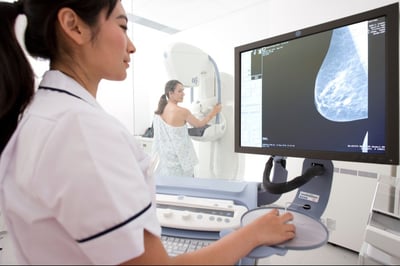Categories Prevention, Screening



Relevance: High
Most relevant for: People diagnosed with cancer who have not yet had genetic testing
Study: Genetic testing among people with cancer can find mutations that may affect treatment and prevention
Despite national guidelines recommending genetic testing, less than 10 percent of eligible patients had genetic testing within two years after their cancer diagnosis. Among those who had testing, 10-30 percent had an inherited mutation that could affect their medical care. (Posted 3/15/2024)
Este artículo está disponible en español.
READ MORE ›


Relevance: Medium
Most relevant for: People with HR-positive and HER2-negative metastatic breast cancer. People with silicone breast implants. People considering thermography screening
Update: News from the FDA– new breast cancer treatment, thermography warning and implant screening updates
This XRAY review is a summary of FDA breast cancer updates from July to December 2023. This includes a new drug approval and two consumer updates. (Posted 2/21/24)
Este artículo está disponible en español.
READ MORE ›


Relevance: Medium
Most relevant for: People at increased risk for breast cancer undergoing prophylactic bilateral mastectomy due to an inherited mutation in BRCA1, BRCA2 or PALB2. People with TNBC who still have breast cancer after chemotherapy.
Update: A breast cancer vaccine for people with an inherited BRCA1, BRCA2 or PALB2 mutation
A breast cancer vaccine is showing promise in early clinical trials. Initially, the vaccine was tested in people with triple-negative breast cancer (TNBC) who were at high risk for recurrence. Now the vaccine is being tested to lower breast cancer risk among people with an inherited mutation in BRCA1, BRCA2 or PALB2. It is also being tested in people with triple-negative breast cancer who are at high risk for recurrence and are taking the immunotherapy drug Keytruda (pembrolizumab) after completing chemotherapy. (Posted 1/31/24)
Este artículo está disponible en español.
READ MORE ›


Relevance: Medium-High
Most relevant for: People who are at increased risk for stomach cancer due to an inherited mutation.
Study: H. pylori bacteria infection and risk of stomach cancer in mutation carriers
The results of a study in Japan show that people with a bacterial infection called H. pylori and an inherited mutation in an ATM, BRCA1, BRCA2 or PALB2 gene have a high risk of stomach cancer. (Posted 1/19/24)
Este artículo está disponible en español.
READ MORE ›


Relevance: Medium-High
Most relevant for: People with an inherited BRCA1 or BRCA2 mutation
Study: Benefit of pancreatic cancer screening
Among people with an inherited mutation in a BRCA1 or BRCA2 gene, screening for pancreatic cancer found most cancers at an earlier stage when they could be treated by surgery. Posted 1/17/24)
Este artículo está disponible en español.
READ MORE ›


Relevance: Medium
Most relevant for: Transgender women with inherited mutations who are considering or have had gender affirming care
Article: Breast cancer risk for transgender women with inherited mutations
There has been little research on breast cancer risk for transgender women who are at high risk for breast cancer due to an inherited mutation. This review summarizes what we know. (Posted 11/29/23)
Este artículo está disponible en español.
READ MORE ›


Relevance: High
Most relevant for: Women who want to learn more about the symptoms of or are at risk for endometrial cancer.
Article: Six endometrial cancer survivor stories
This article shares the experiences of six women diagnosed with endometrial cancer. It highlights the most common signs of endometrial cancer. (Posted 11/16/23)
Este artículo está disponible en español.
READ MORE ›


Relevance: Medium-High
Most relevant for: People interested in the use of artificial intelligence in medicine
Article: Artificial intelligence (AI) may find breast cancer on mammograms sooner
Artificial intelligence (AI) tools may help doctors read mammograms. This assistance may lead to earlier diagnoses of breast cancer. (Posted 9/29/23)
Este artículo está disponible en español.
READ MORE ›


Relevance: Medium-High
Most relevant for: People who are not at high risk of ovarian cancer who are having pelvic surgery
Topic: Reducing ovarian cancer risk without removing the ovaries
A leading ovarian cancer organization has recommended that all women who have pelvic surgery should also consider removing their fallopian tubes to reduce their risk of ovarian cancer. (Posted 7/18/23)
READ MORE ›


Relevance: Medium-High
Most relevant for: People who have mammograms
Guideline: What is breast density and why does it matter?
New FDA guidelines for mammograms will go into effect by September 2024. Current FDA guidance requires hospitals and breast centers to give people information about their breast density with their mammogram results. By September 2024, mammogram providers will need to relay to patients who have dense breast that they should discuss the need for additional imaging. This article provides an overview of what breast density means and why it matters. (Posted 6/8/23)
Este artículo está disponible en español.
READ MORE ›